Dude! Take Your Turn!
A Gaming Life
New to Me – August 2019
It’s September, and it’s hard to believe the school year’s about to start. Where has 2019 gone?
August was a good month for new to me games, even if there were only three of them (I did playtest a couple at Dragonflight, but I’m not counting those as “new to me” in this case).
The Cult of the New to Me was also going through its Summer doldrums. Everybody was just tired, enjoying the sun, or just goofing off.
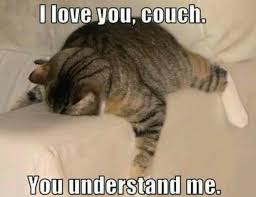
They were too busy relaxing to revolt!
Funnily enough, two of the three I played are by GMT Games, which might be considered odd.
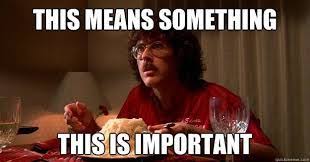
Or maybe not!
So, without further adieu (all of my adieu was lost in a NASCAR bet anyway), let’s get this show on the road track!
Thunder Alley (2014 – GMT Games) – 1 play
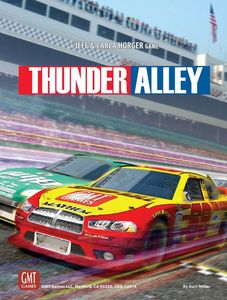
Designers: Jeff Horger, Carla Horger
Artists: Rodger B. MacGowan, Kurt Miller
Players: 2-7
Thunder Alley is a NASCAR racing game (in all but name, since it’s not an officially licensed one, but really, that’s what they are) where the objective of the game is not just to win the race. In fact, you may win the game without winning the race.
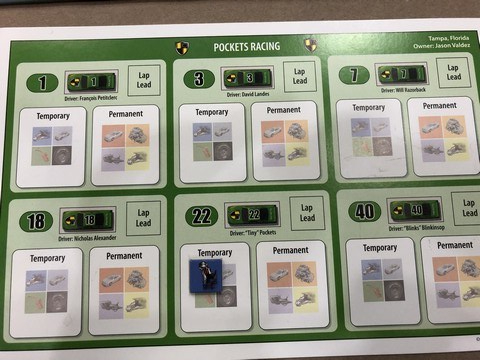
Each player runs a racing team of 3-6 cars, depending on player count. In our game, we had 6 players so we had 3 cars each.
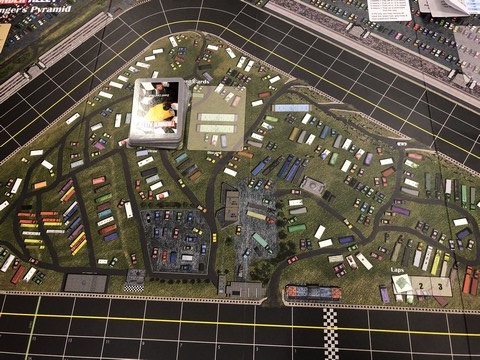
Then you choose the track you want to race on. There is a double-sided board in the base game though there are expansion tracks (this might be an expansion track, I’m not sure).
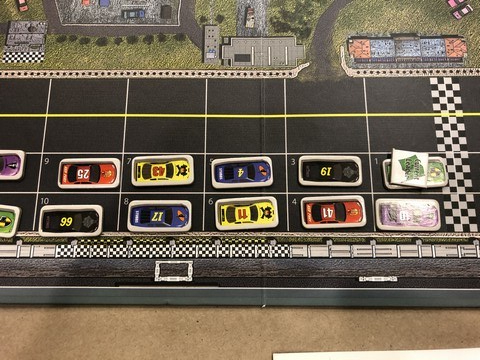
Cars are lined up at the start in a certain order depending on the draw, and then the race begins!
In each round, you will have a hand of cards equal to the number of cars you have on your team plus one (so we had 4 cards). Each round, you will draw back up to a full hand, and you will do this even if you have a car that’s been eliminated (this gives you more options for your remaining cars).
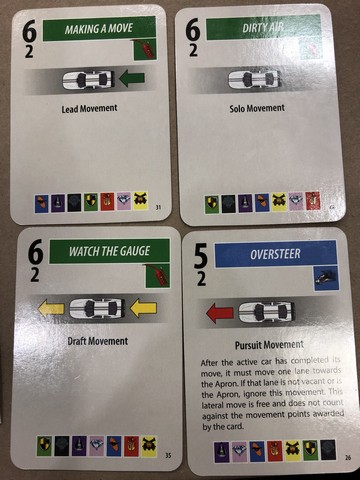
On your turn, you will choose a car to activate (cars can only activate once per round), and play one of the cards in your hand.
Each card has a type of movement on it, as well as a number of spaces to move. Some may have text that will let you do something else or constrict how you move that turn.
With “Lead Movement”, you will be leading all of the cars in a string behind you, and they will follow you like you were a cult leader or something (you know, like me). The cars in front of you can go pound sand, but you will have to go around them (or through them at an extra cost of movement points).
“Solo Movement” means that you’re a lone wolf, making your own way and damned if you’re going to bring anybody with you!
“Pursuit Movement” is the same as “Lead Movement” except that you’re pushing cars in front of you rather than dragging those behind you.
Finally, “Draft Movement” has you moving everybody who’s attached to you, and if you happen to run into cars ahead of you, they all join you like a teenager succumbing to peer pressure (“Yo, come along with us! You know you want to…”).
When you do Draft Movement, you can’t change lanes once you start moving forward, so you just push the cars you encounter ahead of you.
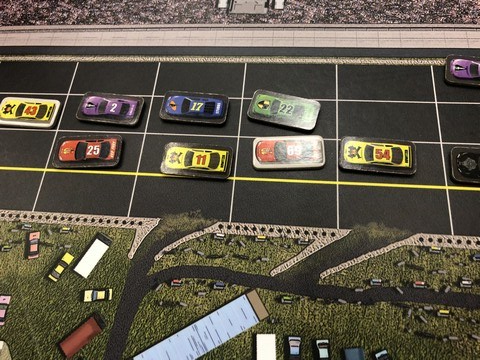
Thus, you’re often going to have strings of cars like this, and a bunch of them will be moving in a pack. Just because your car can only activate once per round doesn’t mean it’s not going to make progress around the track.
Some cards have wear markers on them. If you play that card, you must put that type of wear (gas, tire, suspension, etc) on your player mat for the appropriate car.
Some wear is temporary and will be removed when you make a pit stop. Other wear is permanent and will last for the rest of the race.
If you have at least three wear markers on your car, you will lose speed, with more wear making you slower. Pit stops are good!
Once each car on the track is activated, you go to the end of round stuff. Whoever is in the lead at that point gets a “Turn Leader” token (which gets one point at the end of the game).
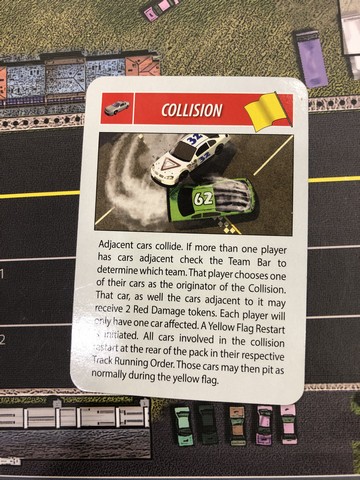
Then an event card is drawn and you get to see what happens.
Some may be bad, some may be…less bad.
Some might give you a yellow flag and some may give you a green (and some may give you a red flag ending the race as well).
After resolving the event, players choose whether to make a pit stop or not (on a yellow flag, it’s less punishing though you do go to the back of the lineup).
Whoever is in the lead at this point becomes the first player for the next round. Cars that have been lapped (meaning somebody is a full lap ahead of them) are removed from the game.
You can discard any remaining cards in your hand you don’t want, or keep them for the next round.
Continue this until somebody has crossed the finish line! That activates the end game and position markers are distributed based on where cars are on the track at the end of the round (or when they cross the finish line if they manage to do so).
Add up the points for all of the position markers, and whoever has the most is the winner!
I absolutely loved this game. I’ve played it once on VASSAL before via PBEM (so many acronyms! That’s “Play be Email”) and it always sounded cool. I received the game in a math trade but was too intimidated by everything in the box to really get it out and try to teach people.
At this year’s Dragonflight convention, I signed up for a game of it, and it’s so easy!
I love how, unlike many racing games, you’re not necessarily trying to win the race. If one of your cars wins but the others finish in last place, you will lose.
I love the joint aspect of the game. You’re not actively trying to help other players, but your moves to help your other cars will inevitably help them as well. You just have to figure out how best to work it so you don’t help them *too* much.
I will definitely be bringing this game to Sunday game day now that I have a play under my belt.
Another hit for me from GMT Games.
Ancient Civilizations of the Inner Sea (2019 – GMT Games) – 1 play
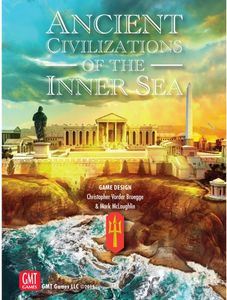
Designers: Mark McLaughlin, Chris Vorder Bruegge
Artists: Blackwell Hird, Kurt Miller, Chechu Nieto
Players: 1-6
Another GMT Game!
This one sort of dropped in my lap. I’ve heard a lot of good things about it, but there is a lot of “take that” stuff in the cards. So much so that I knew I would never get it to the table (not to mention the length of the game, though you can just do one Epoch rather than the full four).
I was wandering around Dragonflight Saturday morning, however, and saw a guy setting up his copy of this that he had just received that week. I asked if I could join in, and he said sure! He said it should only take a couple of hours. I had heard about the length and kind of doubted that, but I later learned that he was only planning on playing one Epoch, which is where the 2 hours came from.
Anyway, let’s take a look at this fascinating and fantastically fun game (as long as you don’t mind messing with other players).
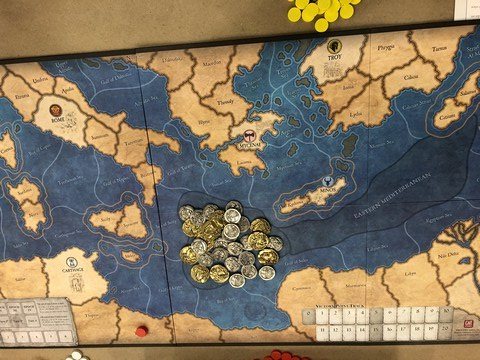
The map is basically a map of the Mediterranean Sea back in ancient times (the time scale is kind of abstracted, as you can play as the Romans but Epoch I is roughly considered to be 3000-1200 BC and Troy certainly never interacted with the Romans!).
There is a player setup example in the rulebook for each player count up to 6 with what civilizations they should choose between as well.
While the setups tell you which civilizations should be in that game, there are ten in the game (Rome, Carthage, Celt-Iberia, Gaul, Mauretania, Mycenae, Troy, Phoenicia, Minos, or Egypt). Some of these might be used in specific scenarios from the Playbook.
The full game last four Epochs, which are at least two turns long (they could be up to four turns). Each turn is divided into four different phases.
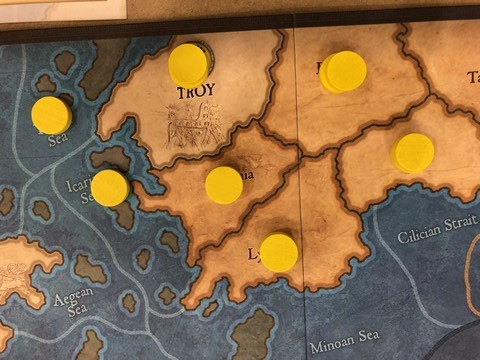
The Growth Phase is where you see how many of your 50 disks (minus the ones you set up on the board at the beginning) you will get to add to your supply. Then, during that phase, you will lay those disks out on the board in adjacent areas to one of your other disks. You can string them along as much as you want. You’re not restricted to areas you had at the start of your turn.
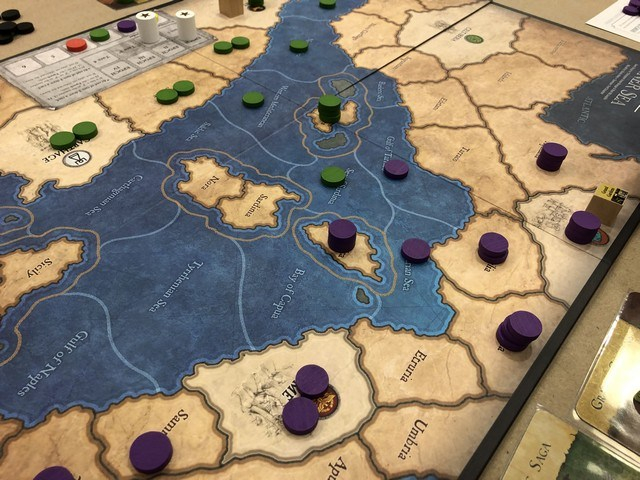
You can enter areas where other players are. As long as you all have only one disk apiece in the area, you’re fine. But there will be tension if anybody has more than one disk. It may even lead to war!
But first, there’s the Card Phase.
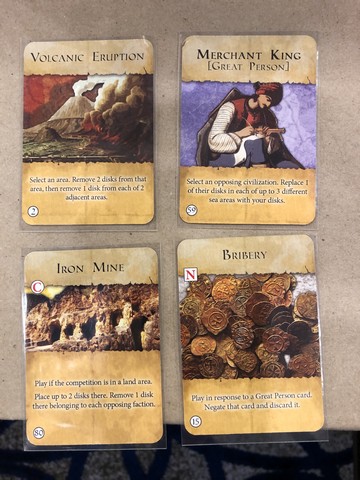
In this phase, each player will, in turn order, be able to play one card from their hand.
And these cards can be nasty!
Some cards are played in other phases (like Iron Mine is played in the upcoming Competition Phase) while others can negate cards played against you (Bribery negates a Great Person card played against you).
But look at Volcanic Eruption. It can remove up to 4 disks from three different adjacent areas. That can devastate cities! (A camp is one disk, a settlement is two disks, and a city is three disks). If somebody has three cities in adjacent areas, you could lay waste to them, reducing them to a camp and two settlements.
Merchant King will allow you to replace one of an opposing players disks in an area with one of your own. That will also reduce from city to settlement to camp depending on how many disks they have there.
Ouch!
Any time a player has to remove a disk, they can discard a card or pay a coin to avoid the removal, which can be nice (but cost prohibitive after a while)
Card play continues until all players have passed.
The Competition Phase is where you resolve conflicts if anybody has more than one disk sharing a space with an opposing civilization. The “combat” is basically removing disks through a set formula. There are no dice in this game.
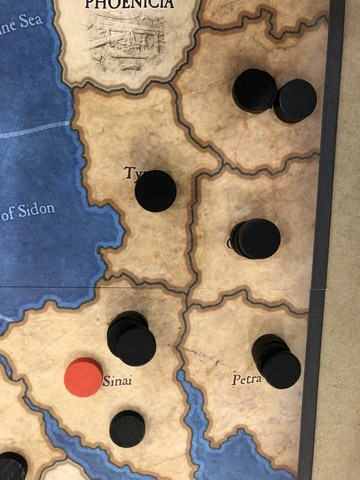
Some cards will put barbarian disks in an area, either replacing a player’s or just on their own. Those have to be fought just like any other civilizations, but they don’t have “cities” per se.
Once all competition is completed, there’s the Reckoning Phase, where you do some bookkeeping around the map, change turn order, gain VPs and perhaps even withdraw and come back as a new civilization!
The interesting thing is at the end of the turn, the Epoch might end. If it’s turn 1, then everybody proceeds to turn 2. However, if it’s turn 2 or 3, a card draw determines whether the Epoch ends or not. If it hasn’t ended by turn 4, then it ends at that point.
When an Epoch ends, there is special scoring and if it’s not the final Epoch (you can choose to play more than 1) you check to see what event happens. Either way, you do end up getting a point for every three talents (that’s the money, not how many stars of the show you have) and turn in all of your money.
Nobody starts an Epoch with money!
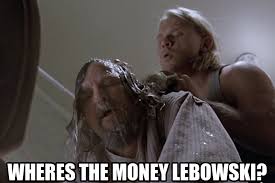
When you’ve reached the final Epoch, whoever has the most points is the winner!
As I said at the opening, I was surprised when the guy who was setting this up said it would only take 2 hours, because I had heard that it was a long game. What I didn’t know is that you could just play one Epoch and stop, so he was right!
However, if you do plan on playing the whole 4-Epoch game, definitely budget 6-8 hours.
But it was fun!
You definitely have to not mind “take that” in a game, because you’re going to be messing with players all over the place. Cities will rise. Cities will fall. Barbarians will come from all directions, sometimes popping up in the middle of your civilization.
I really enjoyed this and would like to play a full game at some point.
If only I had the time.
I won’t be getting this game, however, as nobody in my game group will ever play it (ok, maybe one or two, but that’s it).
This is not any kind of simulation, though, so keep that in mind. There is a lot of abstract stuff there, and the “combat” is not what you might expect. It’s just competition and removing disks.
Some people might not like that.
I, however, definitely did.
Western Legends (2018 – Kolossal Games) – 1 play
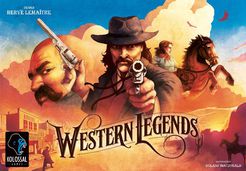
Designer: Hervé Lemaître
Artist: Roland MacDonald
Players: 2-6
Western Legends was a Kickstarter darling last year, and now that I’ve seen it in action, I can tell why that was.
It is essentially a sandbox game in the Old West, where players can be cowboys, cattle rustlers, gamblers, bandits, or even marshals helping the sheriff out with all of the crime happening in this small part of…whatever state it is.
The great thing about it is that all roads can lead to great things! You are trying to accumulate Legendary Points (LP) to become the greatest legend of the West.
I hear there are hotel discounts with that status.
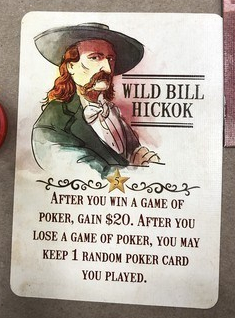
Anyway, each player is dealt two character cards and they pick one. I chose Wild Bill Hickock and his ability guided me to how I would best come closest to winning (Editor: Since we know Dave can’t actually win).
Poker table, here I come!
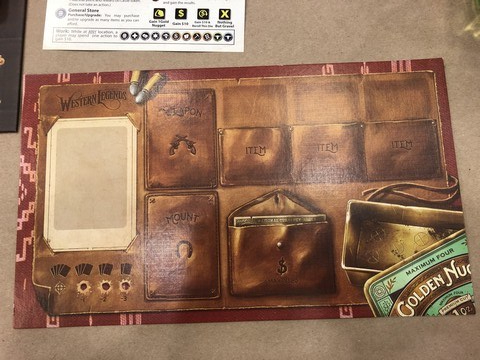
You also get a player board where you will keep all the stuff you accumulate during the game.
You can have three items, one or more mounts (only one can be equipped at a time) and while you can have any number of weapons, only one of them can be equipped as well. You have to decide that when you’re going to be fighting.
You also have a maximum wallet of $120 and can store 4 gold nuggets.
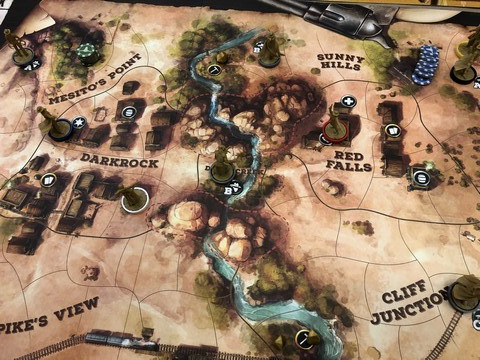
The board is a beautiful (in a rocky, sandy kind of way) rendition of the surrounding area, with two small towns that you can wander between.
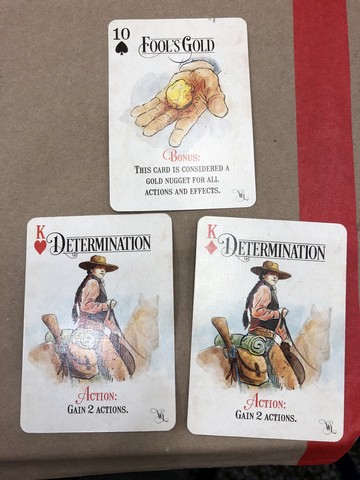
You are also dealt a number of Poker cards based on your character. These cards are used in a number of ways: for their actions, for combat, or for Poker.
Each character has a starting space and you have a bunch of different options for what you can do on your turn. You can do three actions on your turn (repeating the same one multiple times if you wish).
First, you gain $20, draw two Poker cards, or $10 and one poker card.
You can move (2 spaces unless you have a mount). You can play a card for its action (Determination gives you an additional action!). You can fight another character or an NPC on the board (a robber or the sheriff ), or you can take a location action.
The last one depends on where you are. You can mine for gold nuggets in the mine. You can play Poker at the Saloon, rob a bank, shop at the General Store, or “revel” at the Cabaret, acquire Cattle at a ranch, etc. You can also heal at the Doctor’s Office if you’re wounded.
Many of these actions can give you LPs. Reveling will get you up to 4 LPs (1 LP for each $30 spent). Winning a fight can get you LP, winning at poker will get you 1 LP. Depositing gold nuggets at the bank gets you 1 LP per nugget.
In other words, your choices are vast.
What’s really cool about Western Legends is that you can be a good guy or a bad guy (or neither), and both of them will do well for you.
If you rob a bank or a player, or rustle cattle, you will get Wanted Points. Each time you get Wanted Points, you will get a benefit and then you will get LP at the end of your turn based on where you are on the track.
If you defeat bandits or arrest a wanted player, you will get Marshal Points. Each time you do, you’ll get a benefit (money or LP), and then at the end of the game, you will get LP based on where you are on the track.
And the game has no memory!
What does that mean? It means if you’re on the Marshal track, you can rob a bank and become Wanted. You move your marker from the Marshal track to the Wanted track.
While you can’t gain Marshal Points while you are Wanted, once you are arrested you lose all of your Wanted points. You can then start gaining Marshall points and go straight.
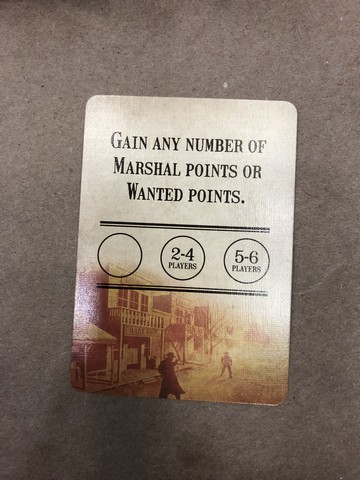
The other interesting thing about the game is the story cards.
There are always two story cards available, and when you satisfy the conditions of one of them, you put your disk on there. When it’s full at the end of a turn, the story card resolves. The result can be a bunch of different things depending on what the card was to begin with.
Most of the story cards are fairly easy to get your disk on. The above one just means you get a point on either Marshal or Wanted track. You could even just play a card with an action that says “Gain 1 Marshall Point”. Some other story cards require that you spend $80 on a single turn (the Cabaret will solve that right there!). Others may say to end your turn outside of town.
There a lot of little details I’ve left out of this description, but suffice to say that you can choose different paths to victory each game, some of which may be helped by your character’s Legendary ability (when you have gained 5 LPs, the ability kicks in).
I played Wild Bill, as I said, and after I bought a hat that would give me an LP when winning Poker, I was able to start really collecting them. Poker games can gain you a lot of money to begin with, so then it’s off to the Cabaret! And maybe a little bandit capturing and gold mining just to supplement my income.
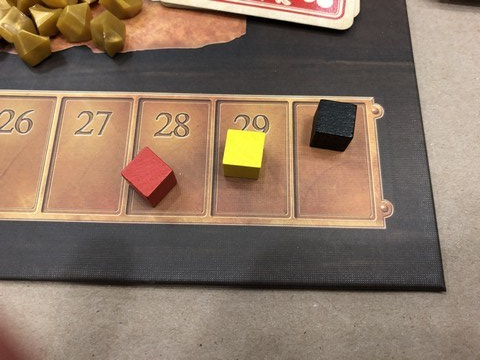
I came close! (I was red).
You can choose a short game (15 LPs), medium game (20 LPs) or a long game (25 LPs). When somebody reaches that plateau, then you finish out the round and then everybody gets one more turn.
Whoever has the most LPs at the end is the winner!
Wow, I really enjoyed this game. I had watched a playthrough on Geek & Sundry and it looked fun, but sitting down to play it was a blast.
I love the story aspect of the game (both the cards and the fact that you can kind of write your own story however you want). There are so many choices, and they can change from turn to turn, though you should have some general outline of how you want to go about the game.
I ended up doing a little bit of Marshal stuff just to get the money and LPs, but I didn’t try to max those out or anything. For me, there was just a lot of gambling involved.
It was very cool.
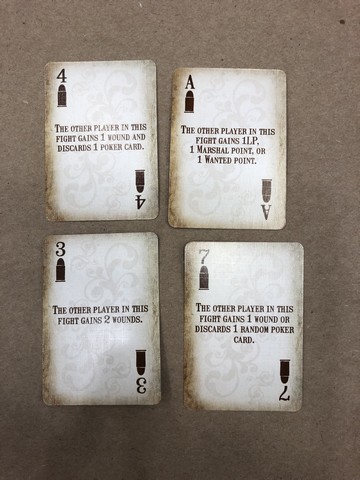
I like the fight mechanism where it’s basically just a game of War (the card game), with highest card winning. However, fighting NPCs (either during a robbery or facing off with the sheriff or bandit) requires a deck of specialized NPC fight cards that have their own effects.
Low cards will let the player win the fight but have a potential bad effect. High cards will have the player lose the fight but get some benefit.
It all evens out.
This was a lot of fun and I would love to play it again.
So what new games did you play in August?
Have you played any of these? What do you think?
Let me know in the comments.


Thanks for description of Ancients Civilizations. For such an abstract but long game I think I will pass with purchase.
LikeLiked by 1 person
I can see that. It’s like nothing I’ve seen you talk about. 🙂
LikeLiked by 1 person
Another thing is to get people from my group for such a long game. Couple of them I can convince but not too often..(
LikeLiked by 1 person
That’s the thing! You can play an Epoch in 2 hours, but if you only play the “short” game all the time, why have it? I would want to get the full meal deal at some point.
LikeLike
Pingback: Ancient Civilizations of the Middle East from GMT Games – Dude! Take Your Turn!
Pingback: Boardgame Geek Top 200 – Play or Played – #130-121 – Dude! Take Your Turn!
Pingback: Boardgame Geek Top 300 – Play or Played – #270-261 – Dude! Take Your Turn!
Pingback: Boardgame Geek Top 300 – Play or Played – #250 – 241 – Dude! Take Your Turn!
Pingback: October 2021 Monthly Update from GMT Games – Dude! Take Your Turn!